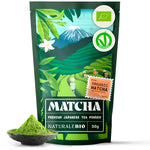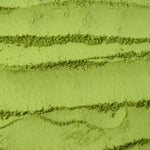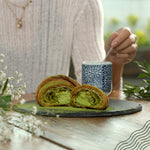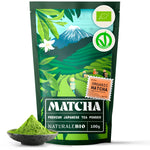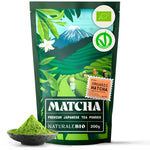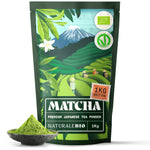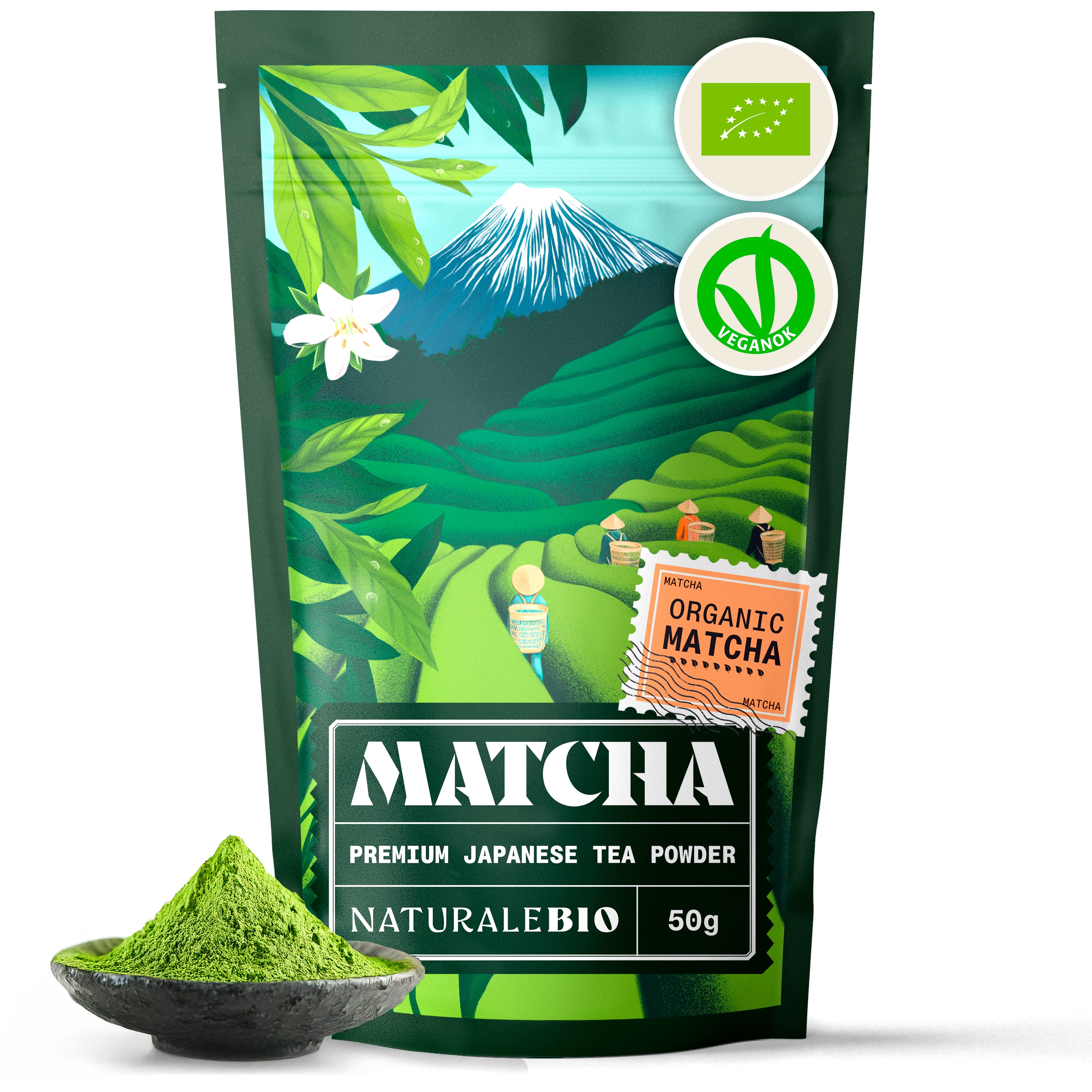
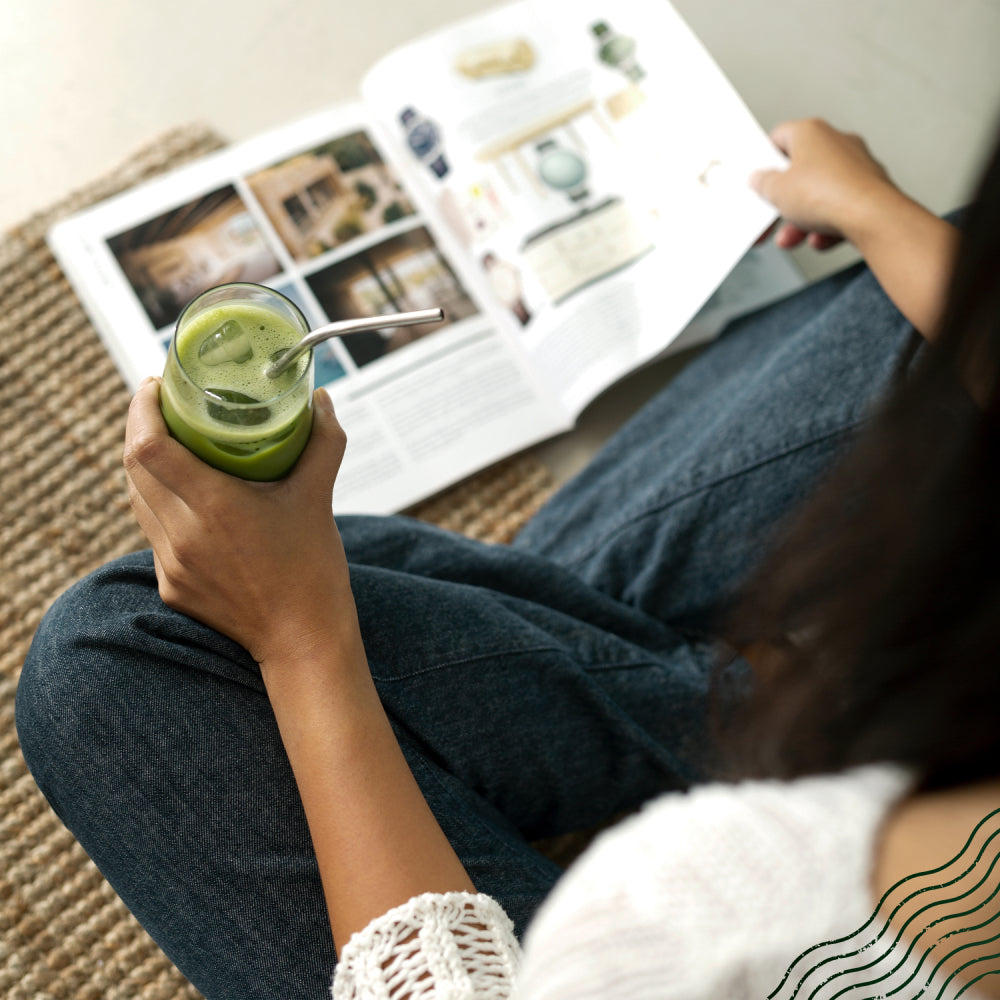
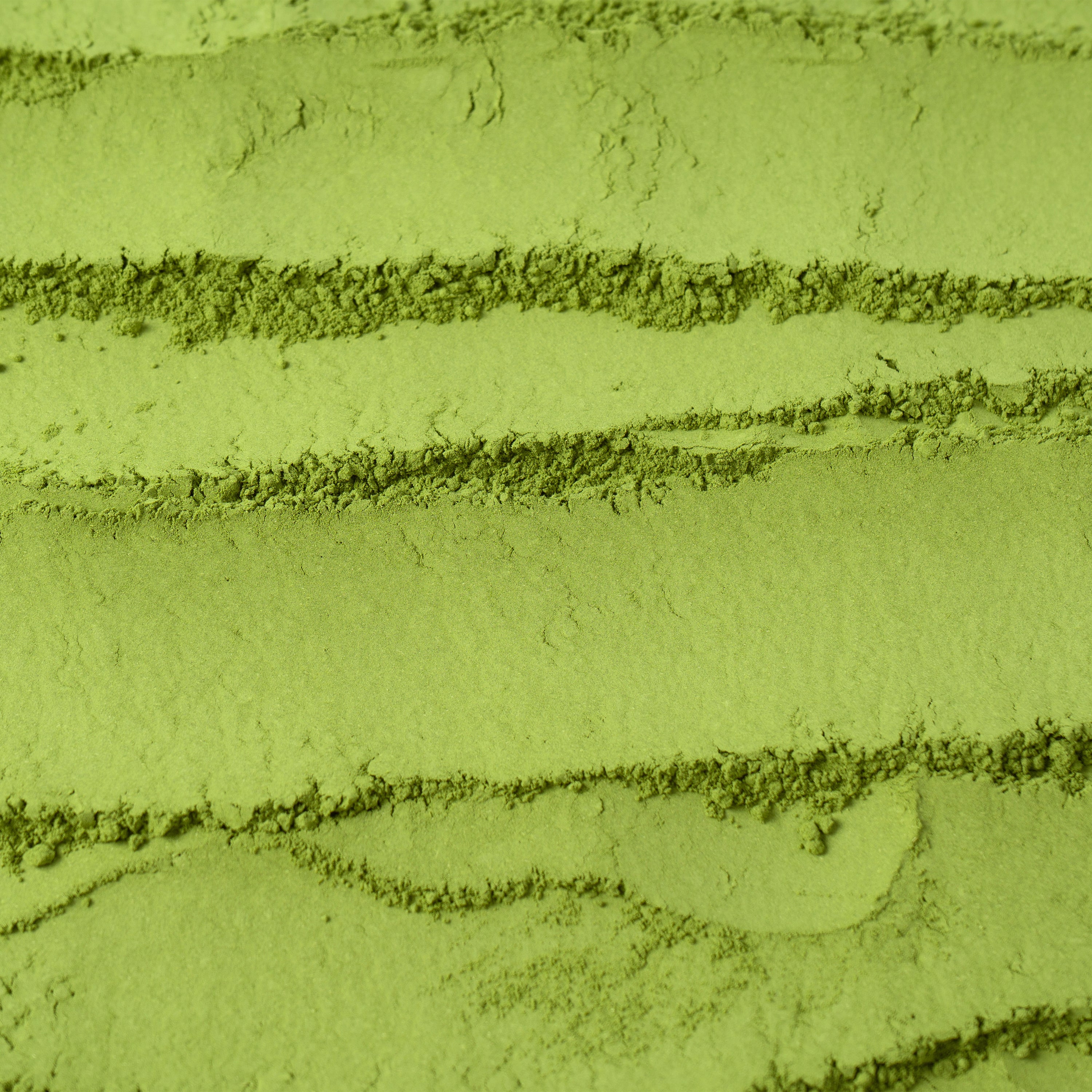
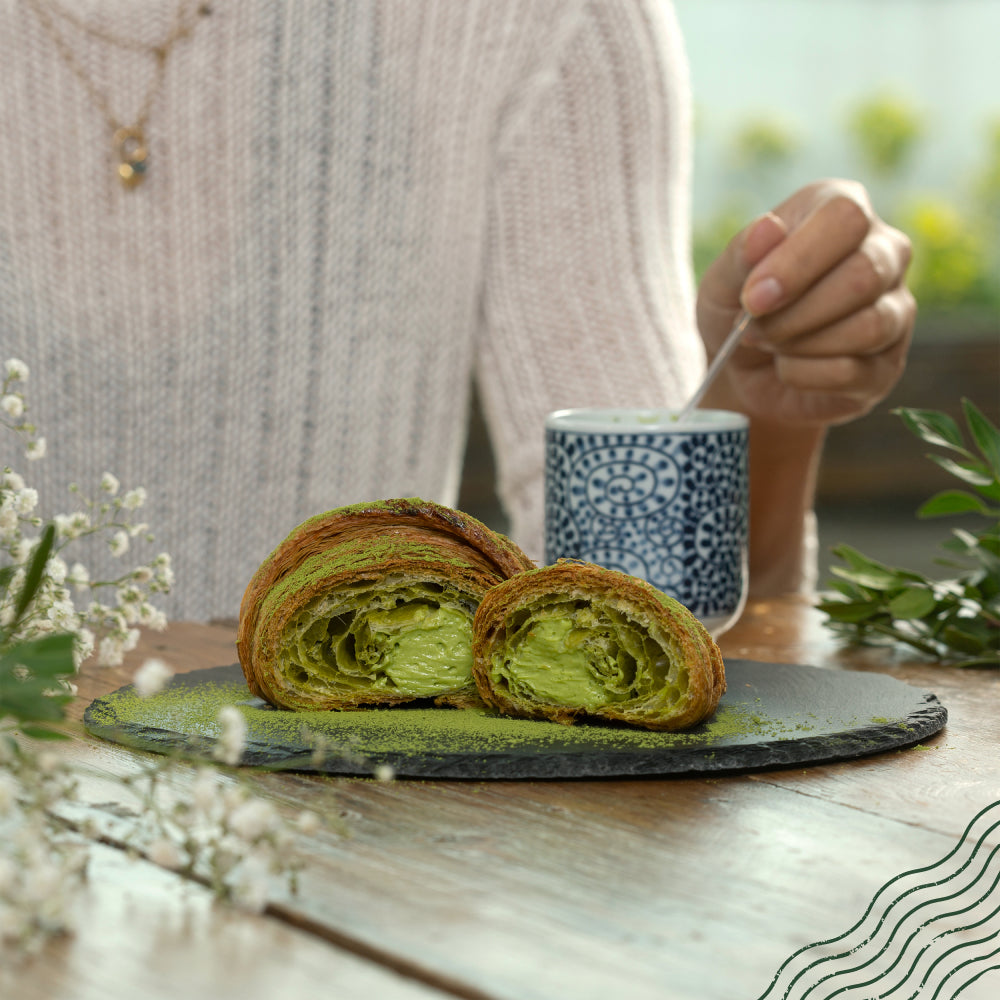
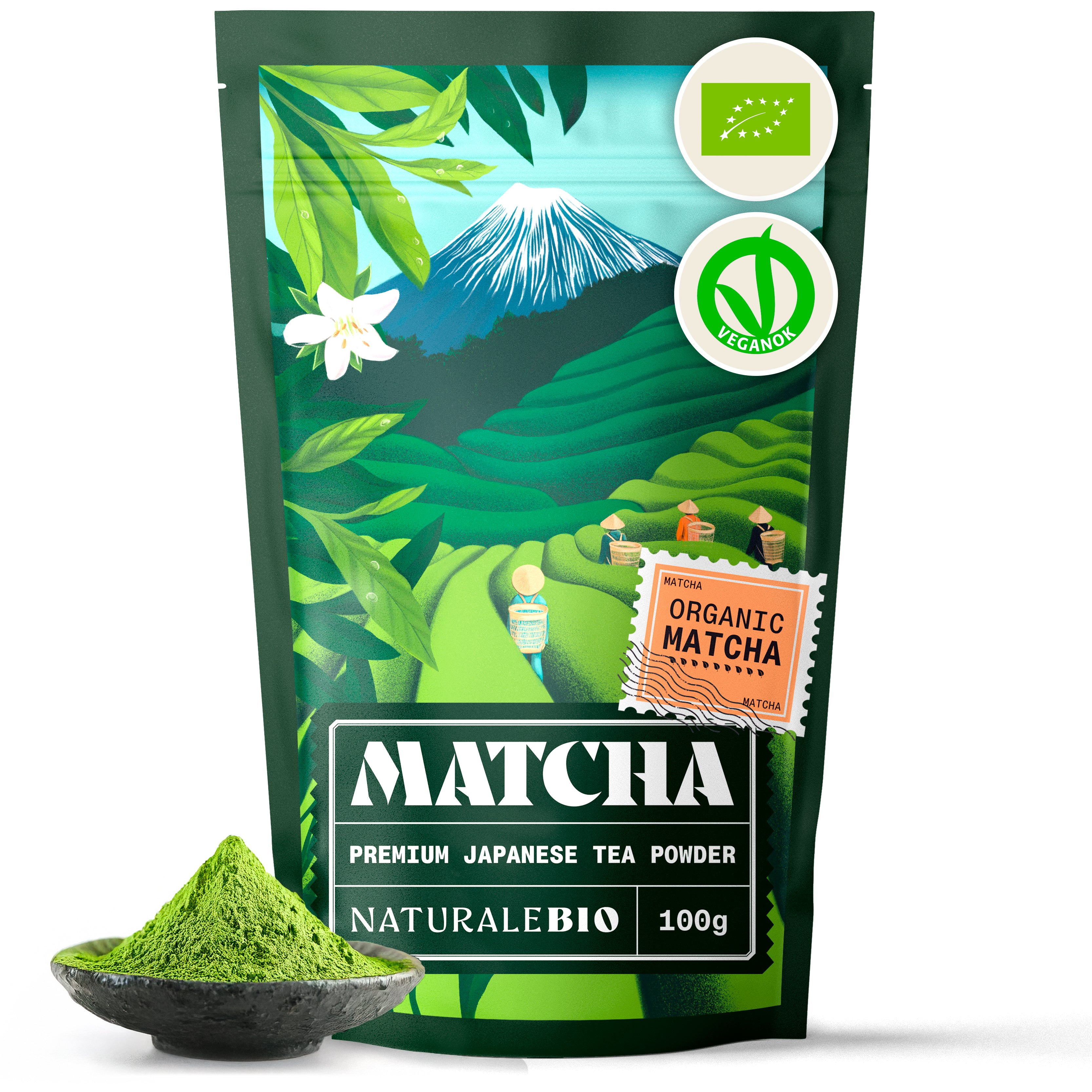
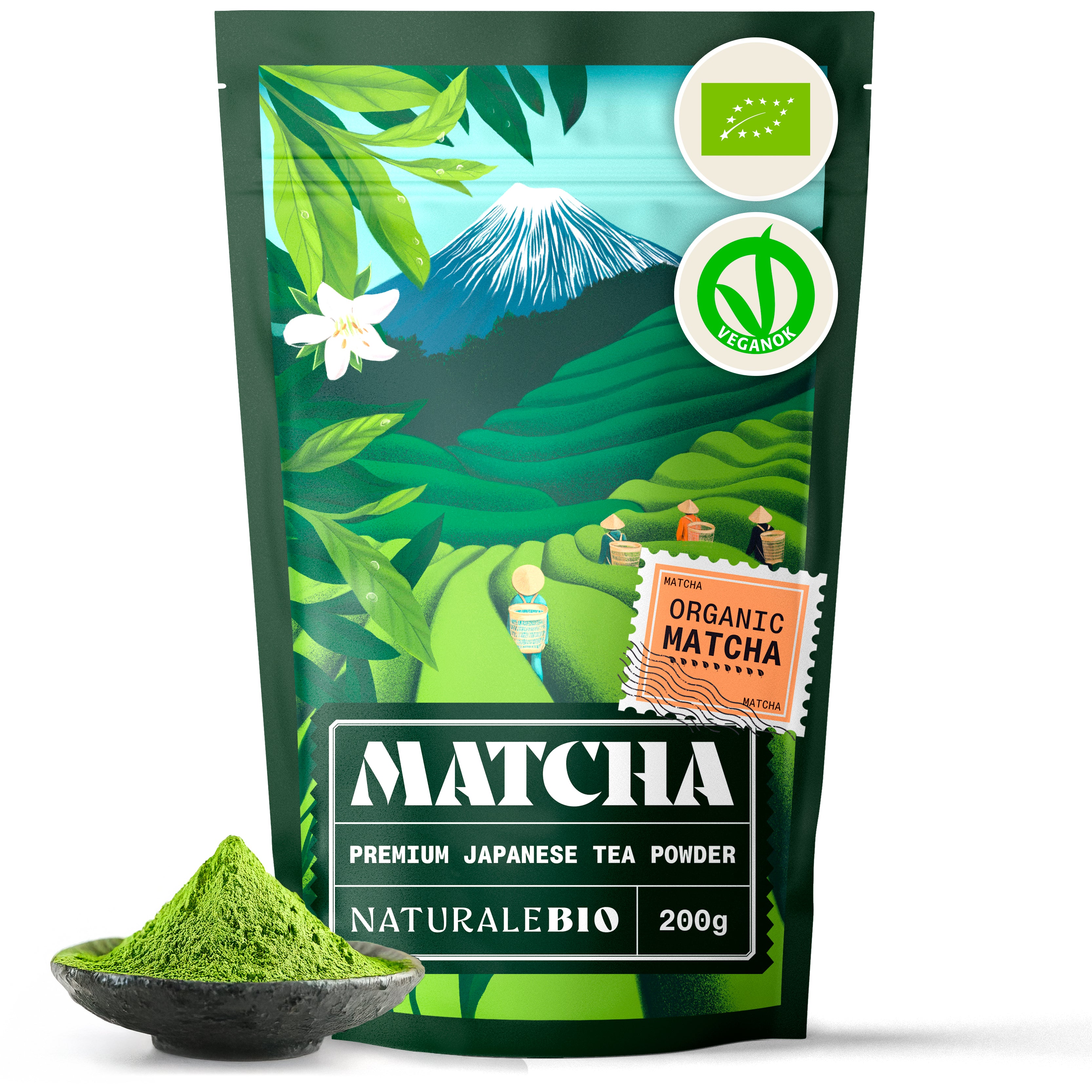
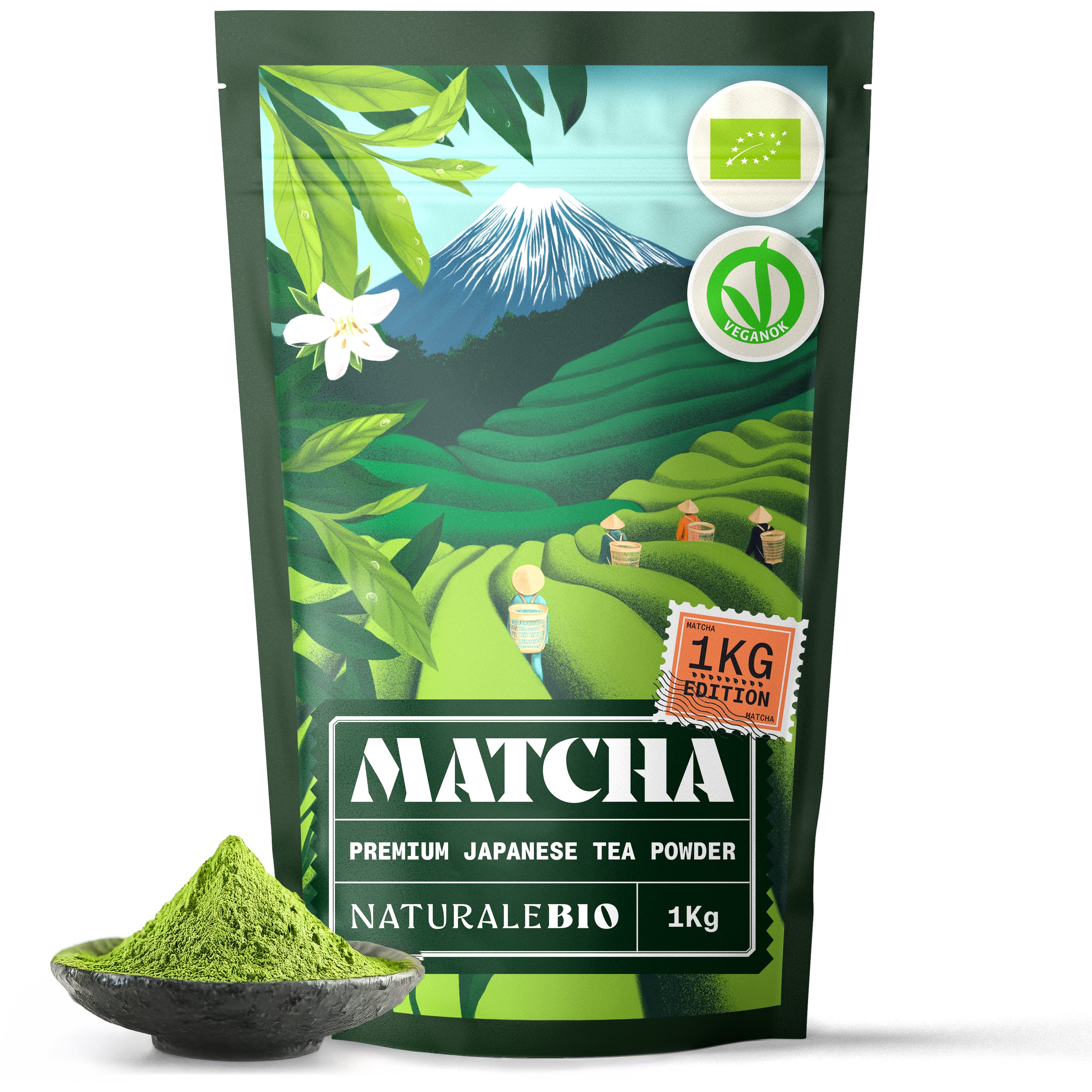
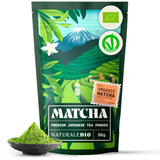

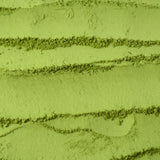
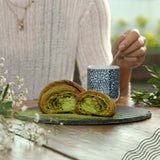
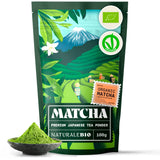
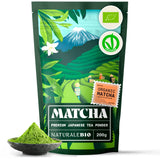
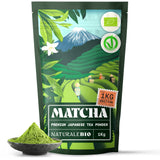
Premium Grade Organic Matcha Green Tea Powder
1.5g recommended serving size. servings per container.
1.5g recommended serving. servings per container.
Ingredients
Organic Matcha Powder
Premium Grade Organic Matcha Green Tea Powder
· First & second harvest Matcha
· Origin: Kagoshima - Shizuoka, Japan
· Shade-grown
· 20 Days of shading
· Smooth powder
· Recipe-friendly
· 100% Organic
Nutritional information
NUTRITIONAL TABLE
*Reference intake of an average adult (8400 kJ/2000 kcal)
Premium Grade Organic Matcha Green Tea Powder
Characteristics
Matcha is a very fine Japanese green tea. Grown in Japan, it is a fine and fragrant powder. The best and most valuable Matcha comes from the city of Uji in the southern outskirts of Kyōto prefecture. The climatic conditions of these areas are optimal for the production of Matcha.
Culinary Grade Matcha
Matcha tea represents the essence of green tea. Traditionally used in Japan. The green tea leaves are protected from the sun's rays for 20 days before being harvested. This method keeps the levels of Theanine and chlorophyll in the tea intact and high.
Organic Matcha
100% Pure and Organic. Without the use of pesticides and unnatural chemical fertilizers that are not helpful for the body and health. Produced in Japan and certified Organic in Italy by control bodies authorized by the Ministry of Agricultural Policies.
Properties
High in antioxidants (especially EGCG)
Rich in chlorophyll
Natural source of L-theanine
Provides steady, calm energy
Bright green color
Fine, smooth texture
Earthy, slightly bitter flavor
Versatile for recipes (sweet and savory)
Boosts focus and alertness
Supports metabolism and detox
Benefits
Rich in antioxidants
Reduces stress
Increases concentration and memory
Speeds up the metabolism
Increase energy and improve mood
Draining and detoxifying effect
Improve digestion
Hepatoprotector
Recipes
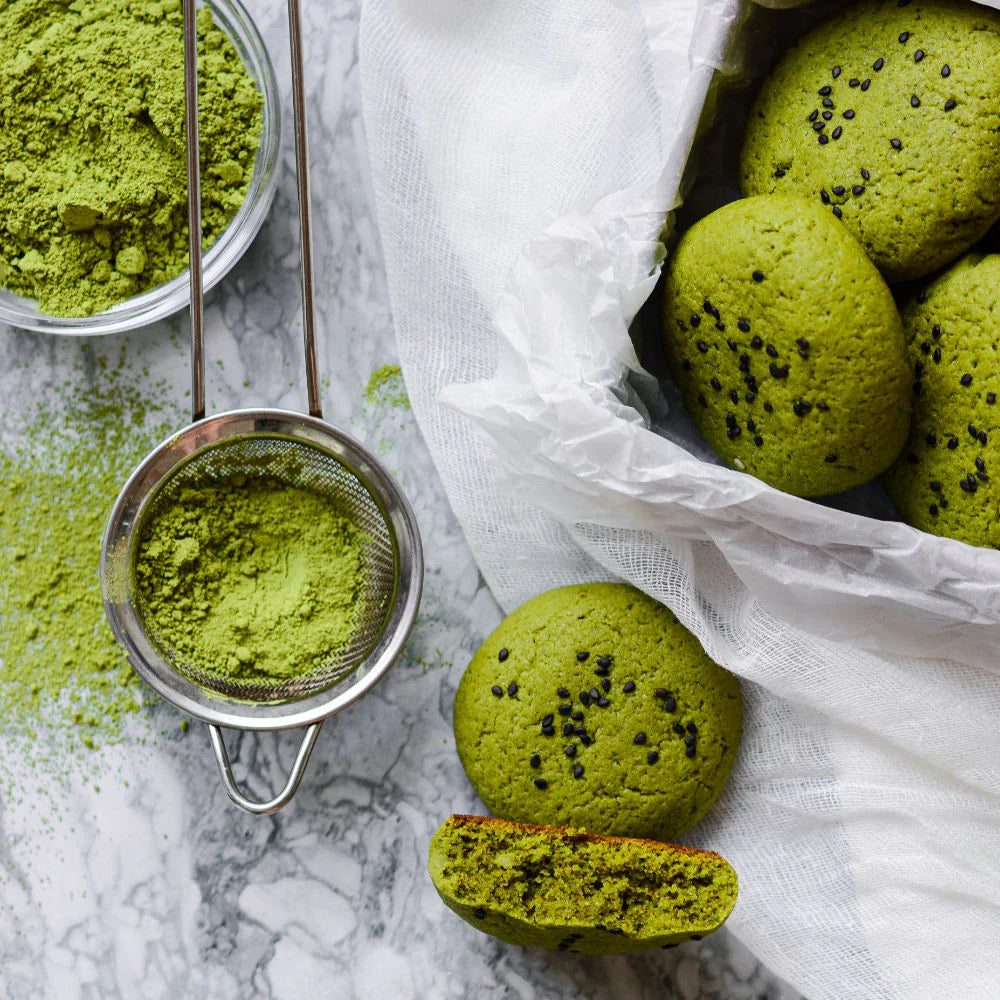
Preparation time: ~30 min
Ingredients
2 tablespoons of matcha green tea and 250 ml of water
sugar to taste
Ladyfingers to taste
4 eggs
110 grams of sugar
500 grams of mascarpone
Matcha tea to taste
Sugar to taste
Ladyfingers to taste
Preparation
Heat water in a small saucepan. Put matcha green tea and sugar in a deep plate and add the hot water. Soak the ladyfingers in the matcha tea. Mix the egg yolks with the sugar, then slowly incorporate the mascarpone. In another bowl, whip the egg whites and fold them into the cream until a smooth and creamy mixture is achieved. Add the matcha powder. Cover the base of a baking dish with the cream, then create a first layer with the ladyfingers soaked in green tea. Cover with another layer of cream and continue alternating ladyfingers and cream. Sprinkle a small amount of matcha green tea on top of the tiramisu. Let it rest in the fridge before serving. You can use a baking dish or make convenient single servings.
You can also use other types of cookies soaked in matcha green tea.
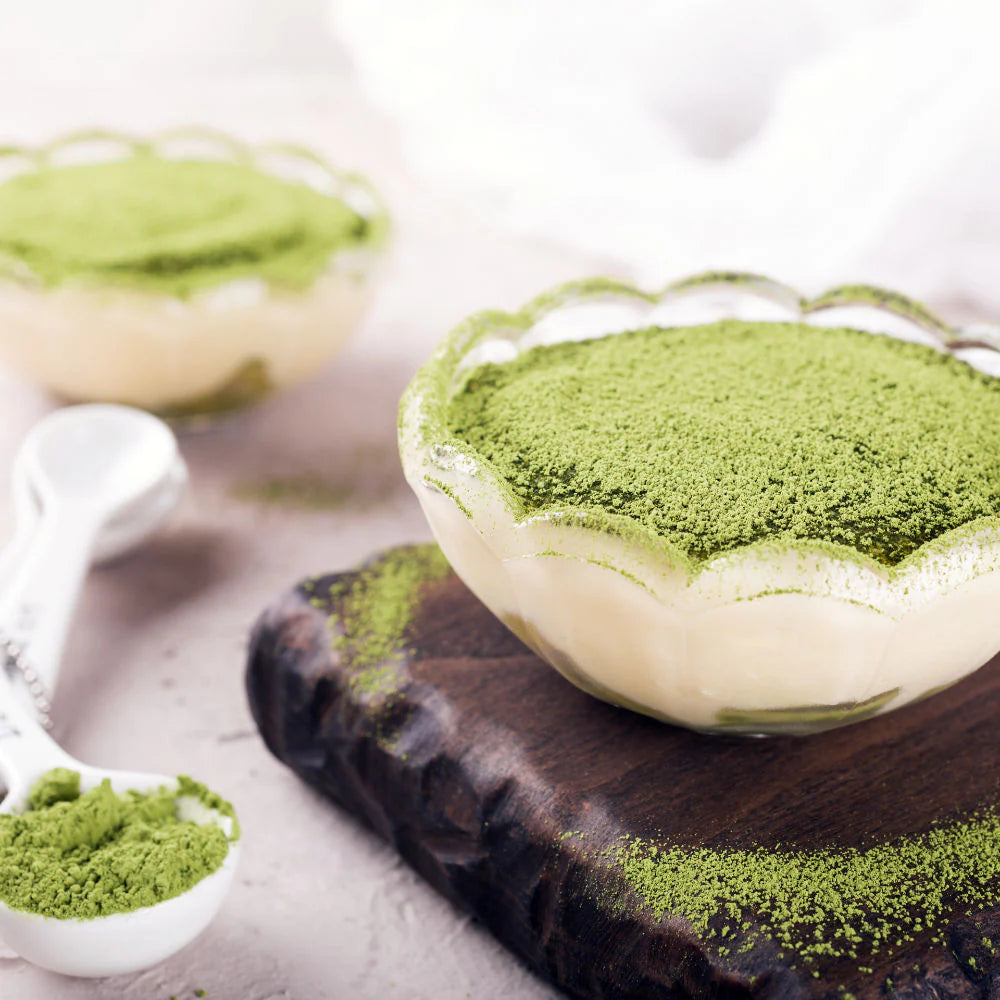
Preparation time: ~60 min
Delicious dipped in tea, but also great with milk. Perfect for a rich and nutritious breakfast or a relaxing afternoon snack. Serve them with a light dusting of powdered sugar on top to make them even more beautiful!
Ingredients
215 g of all-purpose flour
150 g of butter
100 g of powdered sugar
3 egg yolks
1.5 tablespoons of matcha green tea powder
A pinch of salt
Preparation
Sift the flour together with the powdered sugar and matcha green tea. Add the egg yolks, diced butter, and a pinch of salt, and knead until you obtain a smooth dough. Shape the dough into a ball, wrap it in plastic wrap, and place it in the fridge for about 30 minutes. Preheat the oven. Take out the dough and roll it out with a rolling pin (about 1 cm thick). Cut out cookies using your favorite cookie cutters! Place the cookies on a baking tray lined with parchment paper. Bake in the oven at 180°C (356°F) for about 15 minutes.
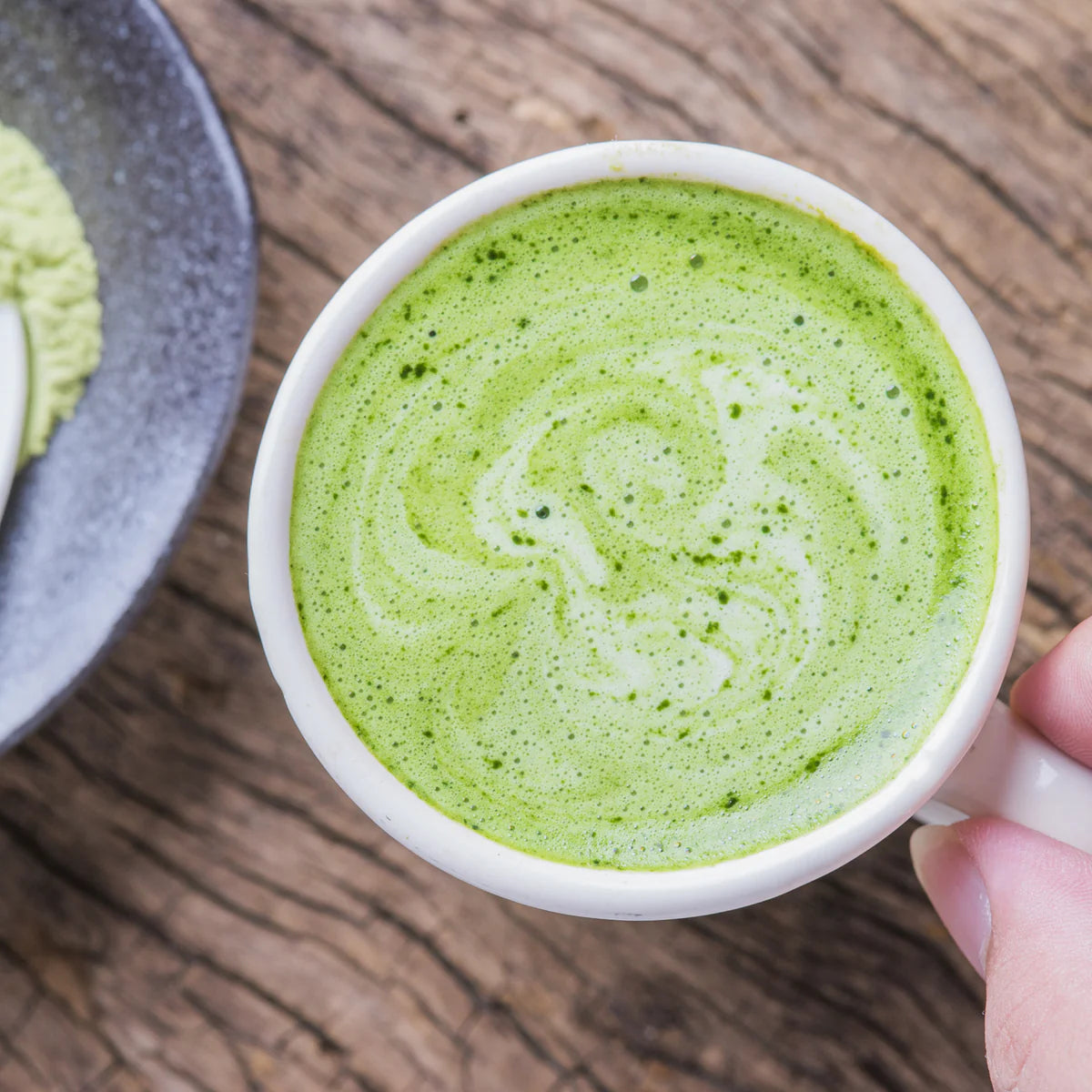
Preparation time: ~5 min
To enjoy a perfect matcha latte, you’ll need a few traditional Japanese tools:
Chashaku – a thin bamboo spoon that scoops the right amount (1g) of matcha for one cup.
Chasen – a wide and stout bamboo whisk, ideal for mixing the tea powder evenly without altering its taste.
If you don’t have these tools, you can simply use a regular kitchen whisk or a milk frother.
Ingredients
250ml of milk
1g of matcha (one teaspoon)
Sugar (to taste)
Preparation
Heat the milk (without bringing it to a boil!). Use the chashaku to pour the matcha into a large cup and add sugar. Add a couple of tablespoons of hot water (40ml), whisking thoroughly with the chasen. Once you obtain a creamy, lump-free mixture, pour in the milk.
Note: Alternatively, you can use cold milk and add ice cubes before serving.
FAQ
What grade of Matcha is yours?
Premium Matcha is made from slightly older leaves. Richer taste with a hint of bitterness. Great for lattes, smoothies, and daily recipes.
Does it contain caffeine?
Yes, each serving (1g) contains approximately 30mg of caffeine, equivalent to 1/3 of a cup of coffee. Matcha also contains Theanine, which has a calming effect and reduces the effects of caffeine.
How is it prepared?
The preparation of traditional Matcha consists of adding 80 ml of water at a temperature between 60° and 75° (not boiling temperature) and 1 portion (1g) of Matcha. Shake quickly using a traditional Matcha Whisk or a normal kitchen whisk.
What is the difference between Premium Grade, Culinary Grade and Ceremonial Grade?
The Culinary grade (lower quality) is used in recipes and as an ingredient in cooking, Premium Matcha is lower quality than Ceremonial, but is still a great alternative to Ceremonial Matcha and is ideal for adding to milk, yogurt, smoothies or in cooking. Finally, the Ceremonial grade, the most valuable, is intended to be traditionally prepared as a drinking tea and comes from first-harvest leaves finely stone ground.
Related products
Recently viewed
The Naturalebio matcha powder is superb. I’ve tasted many different brands in the past, but this one ticks all my boxes. Smooth, not bitter, and makes the most delicious matcha latte. It’s definitely going to be a repeat purchase for me!
Very good
Great product, matcha powder didn’t taste bitter and it’s very easy to dissolve in warm water even without whisking. I only use a fork.
100% recommend and will buy it again.
Ottimo
Very happy with product,all exactly as described.
Will order again when needed.
Good all round service.
Reviews in Other Languages
Der matche lässt sich gut rühren, ohne klumpen mein Problem ist der Geruch so schlimm und der Geschmack ist okay gibt bessere ab r auch schlechtere. Dieser Matcha ist so ein zwischen Ding.
Je suis intolérante à la caféine ne pas me débiter via Klarna
Llegó muy rápido y son excelentes productos seguiré haciendo 🛒🛒


